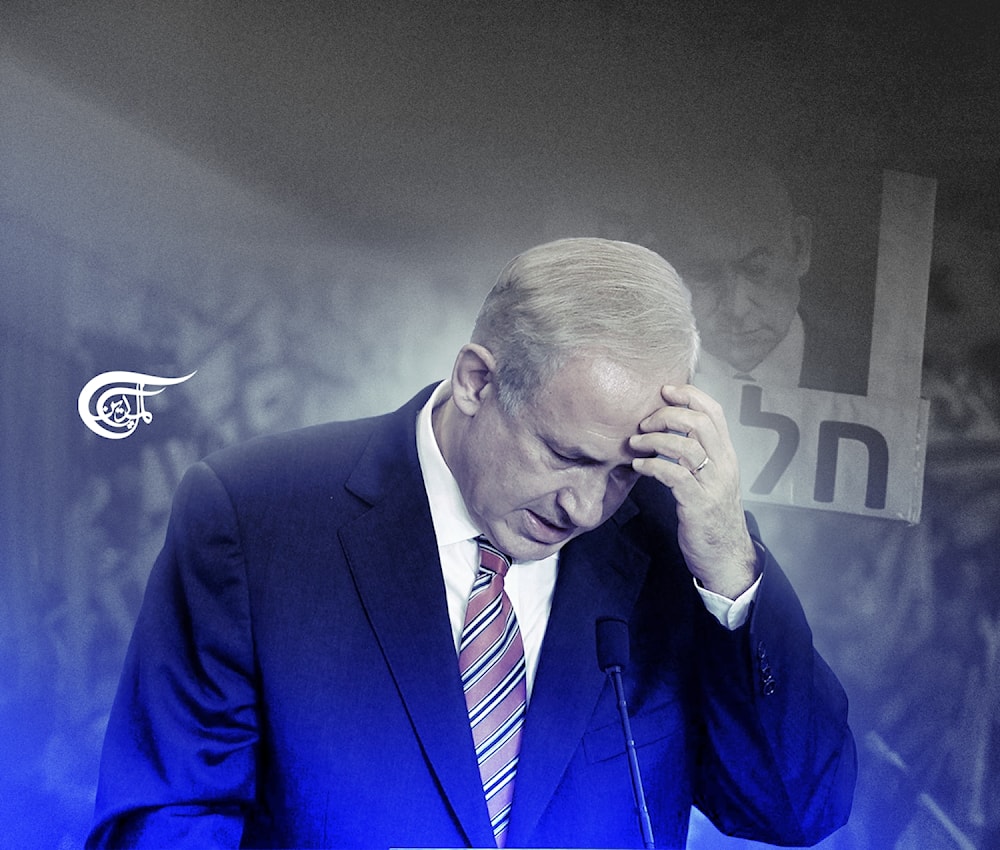Laying bare the extent of Netanyahu’s undoing
Netanyahu’s blatant myth of a total “victory” in Gaza never stuck from the start but is set to shatter with enormous strength hereon.
-

It is a fact that the disgraced Israeli premier cannot lean heavily on his far-right allies to get a lifeline at the center (Illustrated by Mahdi Rteil for Al Mayadeen English)
Israeli Prime Minister Benjamin Netanyahu recently claimed that he would deliver so-called “victory” to Israelis and signaled his unwarranted support to further the occupation’s ongoing genocide in Gaza. “There will be no ceasefire without the return of hostages. It just won't happen,” he said in a recent address as families of the same hostages slam Netanyahu’s hollow rhetoric.
Let’s be clear. Behind Netanyahu’s manufactured ‘victory’ narrative is a damning reality staring his in the eye: his own political survival is on the ropes.
Begin with the streets. Tens of thousands of Israelis took to the streets over the weekend, calling for Netanyahu’s ouster and demonstrating firm defiance to his continuity of rule. These mass protests are estimated to border on the 100,000 mark. It also includes families of hostages that have long construed Netanyahu’s warmongering rhetoric as an admission of failure. Israeli strikes on those hostages continue to validate that sense of failure among the masses. Without any tangible plan in place, the chief Israeli war criminal is one step away from his own political capitulation.
Consider Netanyahu’s highly controversial religious draft as well. He pitched a divisive plan to extend military service exemptions for "Israel’s" ultra-Orthodox, a key stakeholder in sustaining Netanyahu’s coalition. But significant blows to occupation forces on ground and failure to achieve any of the so-called Israeli war “goals” have made it difficult for many Israeli political quarters to exempt this segment of society from mandatory service. That sentiment now extends to Netanyahu’s fragile coalition, including his three-member war cabinet that has elicited a call for resignation if Netanyahu insists on placating the ultra-Orthodox at the occupation’s expense.
Those frictions show no signs of waning. Many within the Israeli occupation forces have grown sour on Netanyahu’s political favoritism, interpreting his push to placate coalition allies as increasingly costly. On the other hand, "Israel’s" economy has shrunk far beyond popular projections, and sustained borrowing to aid the genocide is all set to sap its growth and economic standing.
Meanwhile, the ultra-Orthodox allies are already angry at Netanyahu for an escalating fight involving military service, underlining the fragility of his rule and waning command. Significant calls for early elections, including from war cabinet partner Benny Gantz, add to a substantial survival challenge, confirming the extent of Netanyahu’s shambolic, belligerent and self-destructive performance post-October 7. “We [Israelis] must agree on a date for elections in September, about a year from the war,” he said in a recent televised briefing.
Interestingly, Netanyahu’s blatant myth of a total “victory” in Gaza never stuck from the start, but is set to shatter with enormous strength hereon. Look to the Israeli occupation forces in southern Gaza: they have withdrawn after months of confrontation, inflicted casualties, and ineffective responses to sophisticated, high-precision ambush attacks. There are also reports that nearly all Israeli occupation forces combat units have withdrawn from the Gaza Strip while majority of Israelis back early elections and contest the so-called success of Netanyahu’s genocidal actions for months.
It is a fact that the disgraced Israeli premier cannot lean heavily on his far-right allies to get a lifeline at the center. After all, a possible ejection of ultra-Orthodox parties from his coalition will drive the entire coalition arrangement to the ground, while the far-right insists that Netanyahu needs to up the ante against innocent Palestinians in Gaza, particularly in Rafah. There are limits to how much Netanyahu can lean in that direction: he risks further straining "Israel’s" relationship with Washington, which has made Israeli actions in Rafah a critical consideration for the future. Moreover, from a political standpoint, Netanyahu needs concrete actions to secure Israeli captives, but the view from the ground is that there is no coherent plan in place.
Months of brutal bombardment of besieged Palestinians, their homes, and critical infrastructure have not brought hostages home. Rather, it has killed scores of them. The strengthening of the resistance in the midst of Israeli onslaught has also made clear that the illegal occupation itself is the root of all problems, and that there is no alternative to the path for justice for Palestinians. Netanyahu’s war leadership has seen his own forces kill Israeli hostages, effectively weakening his present narrative that he will secure their return and win over public sentiment.
Even the occupation’s chief backers in Washington have sought to sidestep Netanyahu to advance dialogue with his fierce political opponents. It is a sign of the rampant political and diplomatic isolation of Netanyahu. His strategy is to buy time, but conflicting pressures from his center-right, right-wing, and ultra-nationalist partners suggest that he would have to break even somehow or witness his own capitulation. According to a senior Israeli source, the pullout of occupation troops was linked to ongoing negotiations with Hamas over Israeli hostages, and Netanyahu is "desperate" for a ceasefire deal.
Be it domestic or international, no meaningful leverage rests with Netanyahu.

 Hannan Hussain
Hannan Hussain
 5 Min Read
5 Min Read











